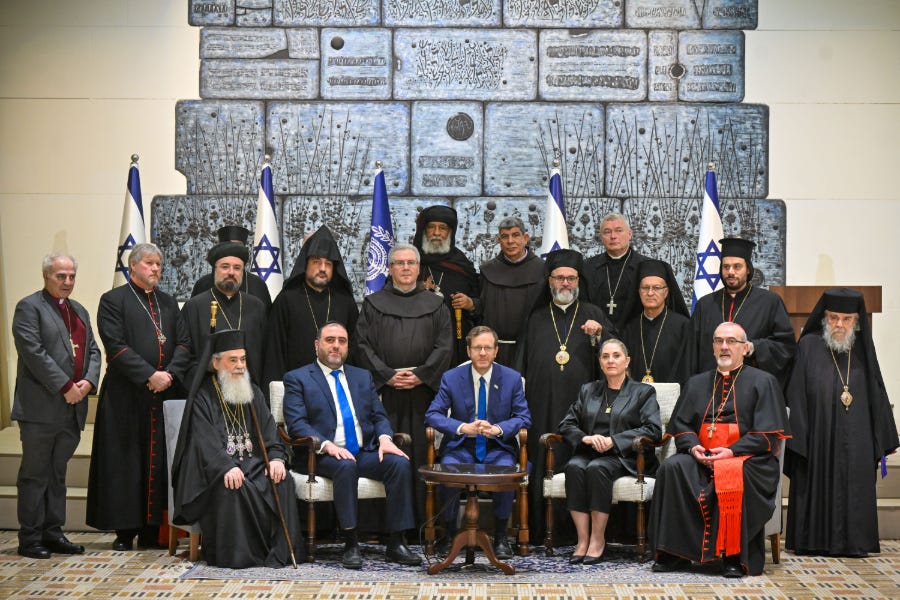What could ‘a new direction’ in Catholic-Jewish relations look like?
Description
Cardinal Pierbattista Pizzaballa told the AP Monday that the Catholic Church is seeking “a new direction” in Catholic-Jewish relations.

Speaking on the eve of the second anniversary of the Oct. 7 Hamas-led attack on Israel, the Latin Patriarch of Jerusalem suggested that a new impulse was needed, not only concerning the Jewish people but also the Israeli state.
“As Catholics, we need also to understand that for the Jewish people, the state of Israel is not just one state among the others. It’s an important reference point,” he said.
Why does Pizzaballa believe there is a need for change in Catholic-Jewish ties and how does he envisage it?
The problem
Cardinal Pizzaballa believes that Catholic-Jewish relations have deteriorated since the Oct. 7, 2023, assault on Israel, in which more than 1,000 civilians and members of the security forces were killed.
He is not alone in thinking this. It is, in fact, a common view on both sides of the relationship.
Following the Oct. 7 attack, Israel launched an invasion of Gaza, the strip of land between Israel and the Mediterranean Sea controlled by Hamas, which the U.S. and other Western countries have designated as a terrorist group. More than 67,000 Palestinians have been killed in the war to date, according to Gaza’s Hamas-run health ministry.
In late October 2023, Pope Francis reportedly had a “fraught” phone conversation with Israel’s President Isaac Herzog. According to the Washington Post, the pope said it was “forbidden to respond to terror with terror.” Herzog is said to have replied that the invasion of Gaza was necessary to defend the Israeli people.
On Nov. 22, 2023, Pope Francis met separately at the Vatican with relatives of Israeli hostages held by Hamas and Palestinian families affected by the Gaza war. At a general audience later that day, the pope said he had heard how both groups were suffering.
“This is not waging war; this is terrorism,” he said.
In a Dec. 17, 2023, Angelus address, Pope Francis condemned the killing of a mother and daughter in the compound of Gaza’s only Catholic church — an act attributed to Israeli snipers by the Latin Patriarchate but denied by the Israel Defense Forces.
“Some say: ‘this is terrorism and war,’” the pope said. “Yes, it is war, it is terrorism.”
In a letter to Middle Eastern Catholics marking the first anniversary of the Oct. 7 attacks, Pope Francis expressed solidarity with the people of Gaza, but was criticized for not referring to the Jewish people or Israel.
In a book published in November 2024, the pope said claims that Israel was committing genocide in Gaza should be “carefully investigated” — sparking criticism from Israeli officials.
Pope Francis kept in near-daily contact with Gaza’s Holy Family parish up to his death on April 21, 2025.
An initial condolence message posted on an Israeli state social media account was later deleted. Four days after the pope died, Israeli Prime Minister Benjamin Netanyahu’s office issued a two-sentence condolence statement. Israel’s ambassador to the Holy See was the country’s sole representative at the papal funeral.
While tensions between the Holy See and Israel might seem to be simply a diplomatic dispute, they have significantly impacted Catholic-Jewish relations, as both entities represent more than just states for their respective communities.
For some observers, the crisis in relations during the Francis pontificate had deeper roots, related to a demographic shift in the 21st-century Catholic Church from Europe to the Global South, and a corresponding move in the center of gravity of Judaism from Europe and the U.S. to Israel.
After 60 years of remarkable improvement in mutual relations following the publication of the Vatican Council II declaration Nostra aetate, which revolutionized Catholic-Jewish ties, relations are once more in the doldrums.

The proposal
On May 8, the day of his election, Pope Leo XIV reached out to the Jewish community.
In a message to Rabbi Noam Marans, director of interreligious affairs at the American Jewish Committee, he wrote: “Trusting i





